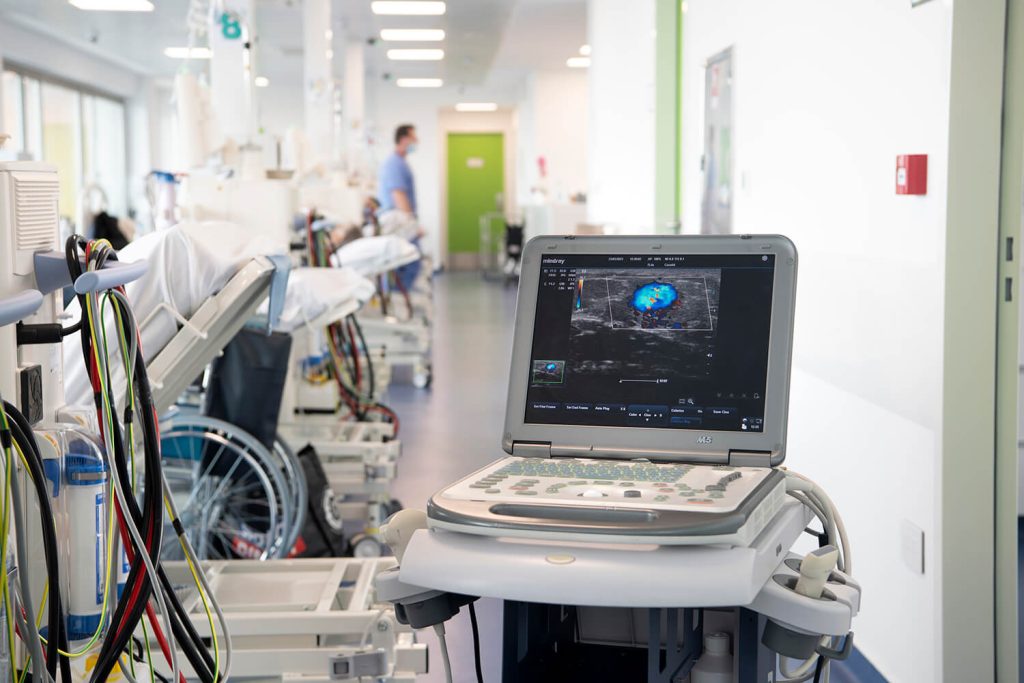Interventional Unit
About
Interventional radiology represents the specialized field within radiology that encompasses a wide range of diagnostic and therapeutic procedures conducted with minimal invasiveness, all under the guidance of advanced imaging techniques. The rapid development in imaging technologies, imaging software, and the state-of-the-art equipment employed in image-guided interventions, combined with the combined expertise of radiologists, has enabled the execution of numerous minimally invasive diagnostic and therapeutic interventions. Many of these procedures, formerly deemed impractical or necessitated prolonged and invasive procedures, are now well within reach.
Image-guided interventional procedures are conducted by specialized radiologists who have received advanced training in these modern techniques, in close collaboration with medical physicists, radiographers, and specialised nursing staff.
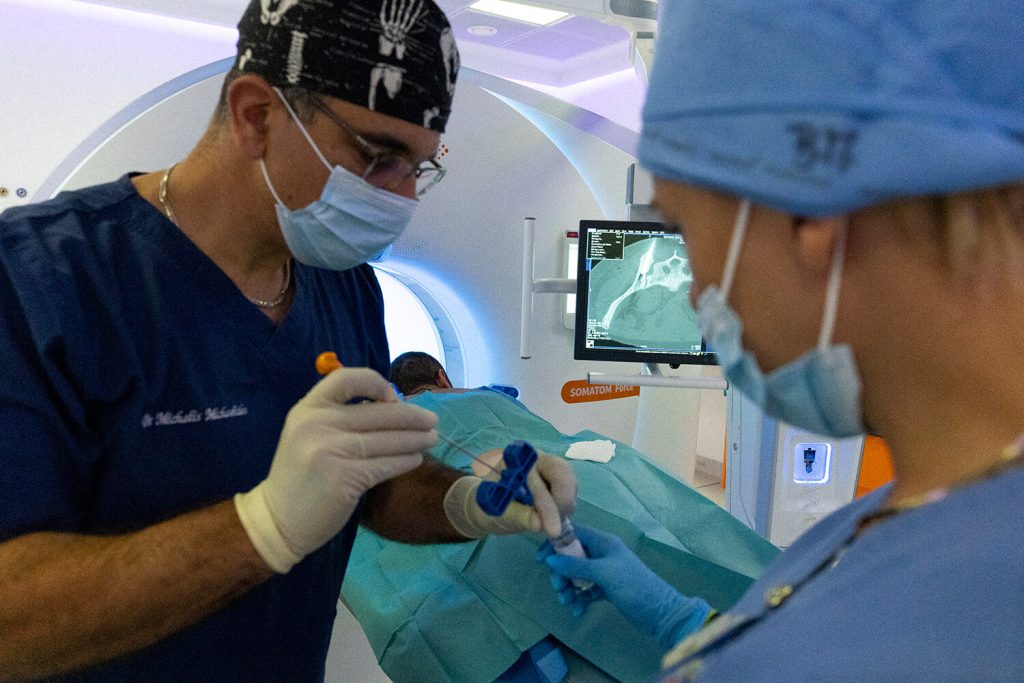
The interventional radiology unit of the German Medical Institute stands as one of the few facilities across Europe where interventional procedures are performed using all available imaging modalities. In addition to the conventional employment of ultrasound, CT and fluoroscopy/angiography, which are established imaging methods for interventional procedures in the majority of healthcare institutions, our centre also conducts interventional procedures with MRI and PET/CT. These advanced modalities serve both diagnostic and therapeutic purposes.
The fleet of medical equipment used for image-guided interventional procedures at the GMI includes two multislice CT scanners, two MRI scanners (operating at 1.5T and 3T), two angiography units, a digital portable C-arm unit, a fixed radiography/fluoroscopy system and a multitude of ultrasound units. Furthermore, the centre leverages a PET/CT scanner, the only of its kind in Cyprus, for personalised image guided interventional procedures.
Magnetic Resonance Imaging
The interventional radiology unit of the centre is the only one in Cyprus with training and extensive experience in performing interventional procedures using MRI guidance. The MRI provides several advantages over other imaging methods, such as the use of non-ionising radiation, improved soft tissue contrast, the capability of three-dimensional imaging and the ability to visualise and delineate pathology without the use of a contrast agents. Whilst offering significant advantages, the presence of a fixed magnetic field and its interaction with the technical equipment required for an interventional procedure make performing these procedures extremely challenging.
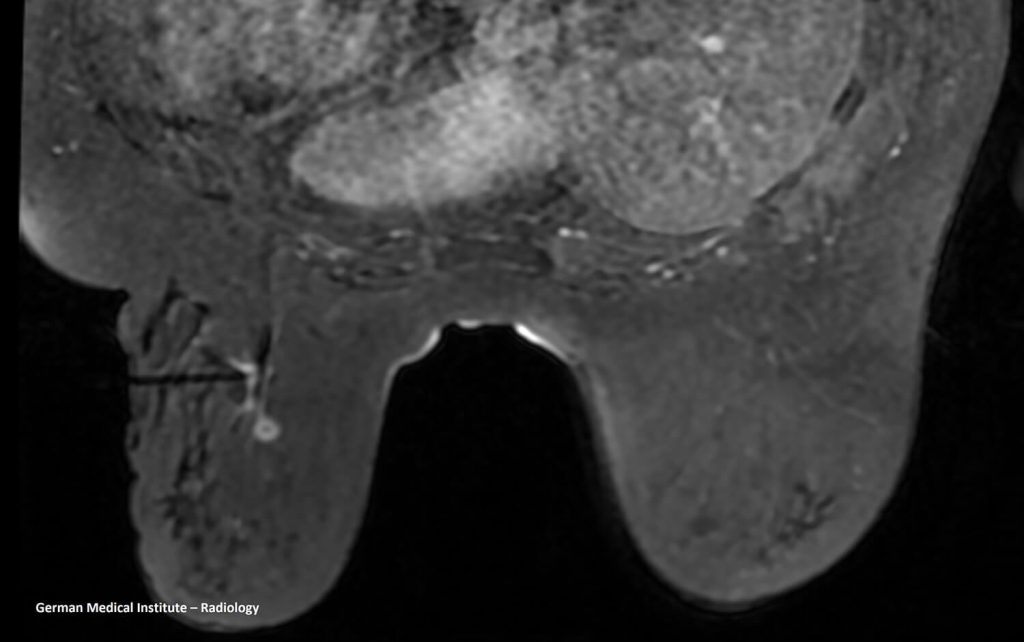
It necessitates specialisation in magnetic resonance techniques, both to reduce imaging error-artifacts as well as to ensure the health and safety of the patient and staff during the procedure. The centre’s team of physicians in collaboration with the medical physics department, radiographers and nursing staff perform the following interventional procedures under MRI guidance:
- Biopsies: Using MR imaging with specialised sequences and techniques, precise sampling is safely conducted from the area of interest for lesions that are distinctly visible through other imaging methods. This is primarily valuable for biopsies in soft tissues like the breast, liver, prostate, kidney, and more.
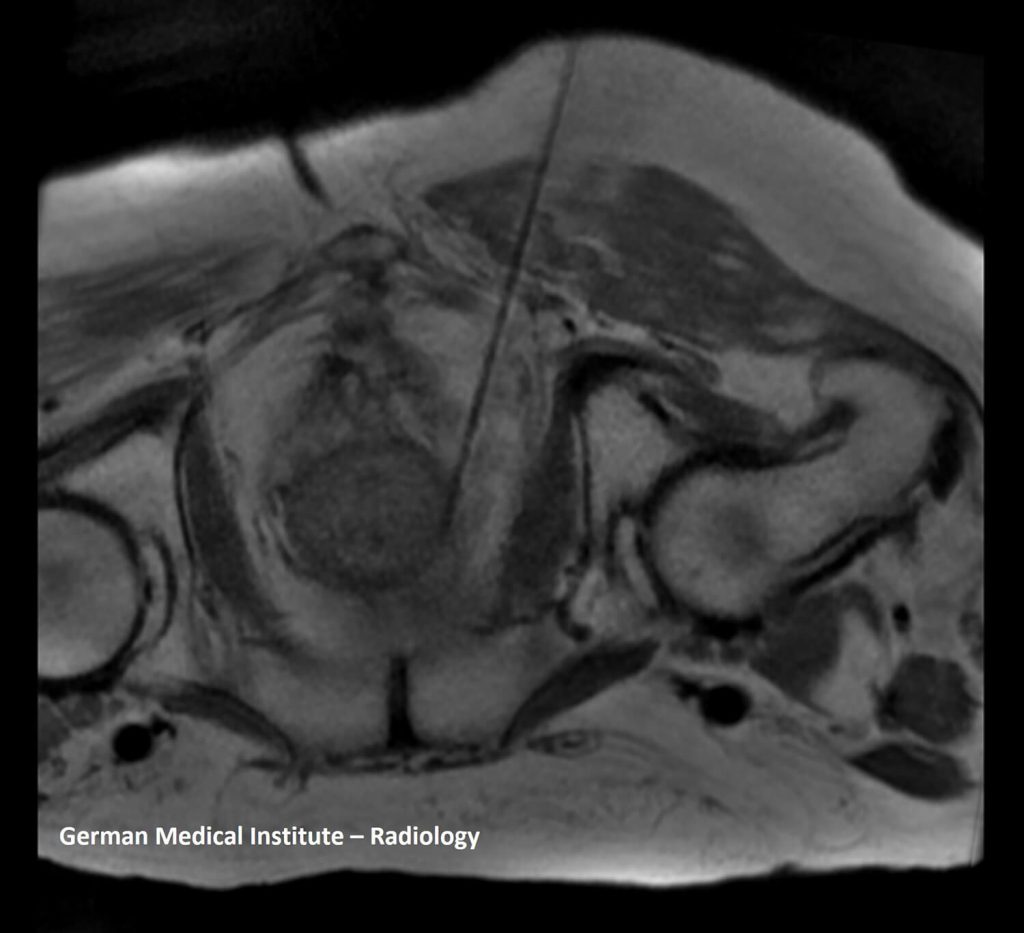
- Percutaneous Ablation: Our centre stands as the sole facility in Cyprus where ablation of tumours is achieved using MRI as the guiding technique. This procedure finds its primary indication in cases where lesions exhibit poor differentiation in CT. It capitalises on the exceptional tissue contrast capabilities offered by MRI and is predominantly employed in cases of hepatic lesions, usually in the development of early HCC in the setting of liver cirrhosis but also in cases of secondary lesions, where targeted thermal necrosis of the lesion is performed with absolute precision while sparing the surrounding tissues.
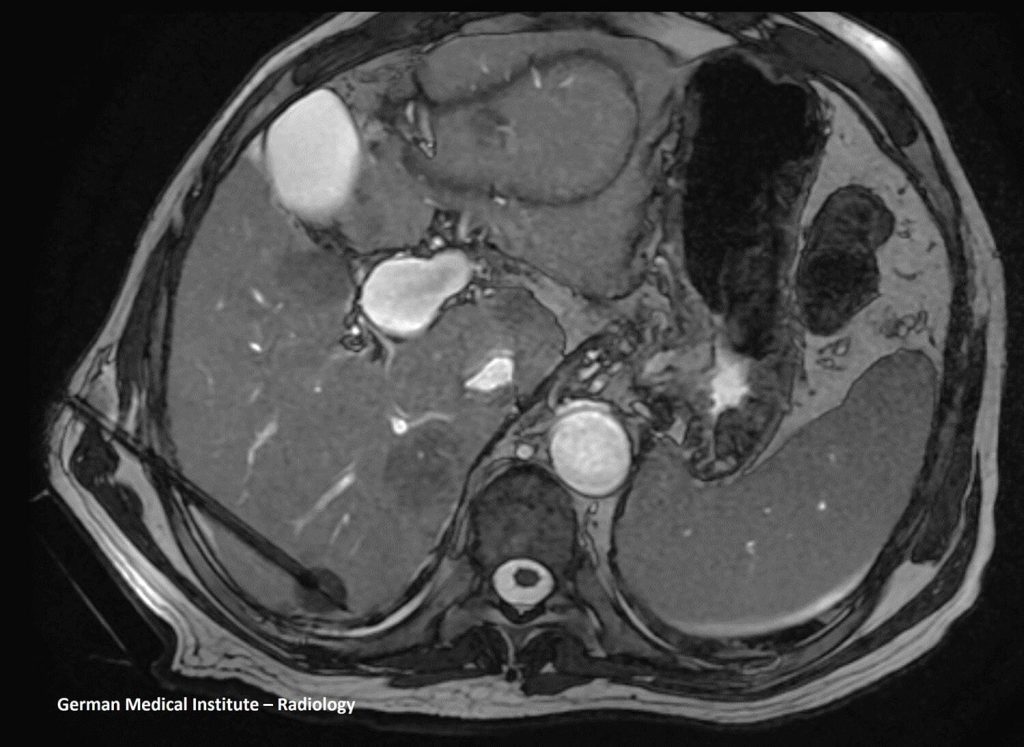
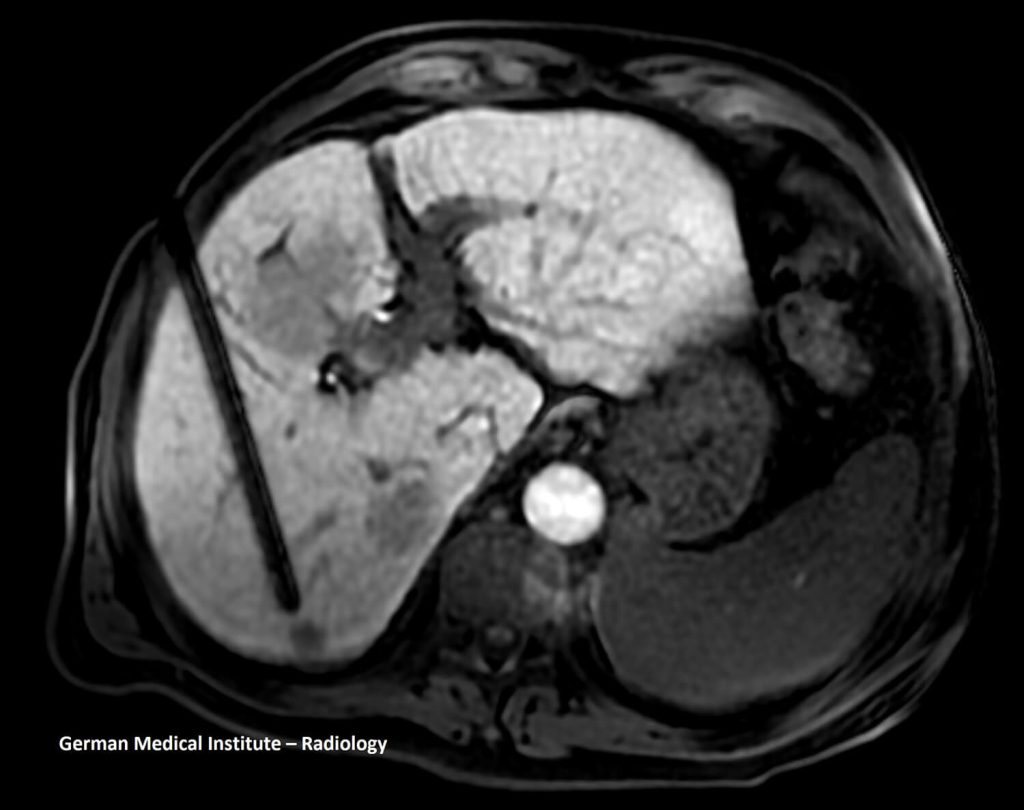
Computed Tomography

The department conducts a substantial volume of image-guided interventional procedures using CT guidance daily. The advanced technology of CT scanners, featuring rapid scanning and real-time three-dimensional reconstructions, enables real-time guidance during interventions using CT-fluoroscopy, thus enhancing precision and safety within the region of interest. Additionally, the department has the capability to fuse images derived from diverse imaging modalities, thanks to specialised software (such as MRI, PET/CT, prior contrast-enhanced CT scans). This coupled with the extensive experience of our radiology team, facilitates the execution of complex minimally invasive procedures with the utmost accuracy and safety.
Interventional procedures are typically performed under local anaesthesia, although in some cases the presence of an anaesthesiologist is required to administer light sedation or general anaesthesia.
The department’s medical team, in collaboration with the medical physicists, radiographers and nurses, perform the following interventional procedures under the CT guidance:
- Percutaneous image-guided biopsies are performed on a wide range of organs (lung, mediastinum, bone, spinal cord, liver, pancreas, kidneys, neck, abdomen, pelvis, soft tissue biopsies).
- Percutaneous tumour ablation: is performed using thermal energy (Microwave Ablation, Radiofrequency Ablation, Cryoablation) or Irreversible Electroporation (Nanoknife). Advancements in technology, along with a deeper understanding on the therapeutic mechanisms of thermal ablation, has established these methods within the domain of minimally invasive interventions for the management of malignancies, and on rarer occasions, benign lesions in a variety of organs (liver, lungs, kidneys, bones, soft tissue, etc.).
- Neurolysis employing Radiofrequency Ablation is utilised as an intervention for pain management in a variety of conditions (trigeminal nerve, celiac plexus, sacral plexus, etc.).
- Percutaneous injections – arthrography.
- Treatment of frozen shoulder with Hydrodilatation.
- Percutaneous punctures and drains with placement of a drainage catheter (pneumothorax, abscess collections, ascitic and pleural collections, nephrostomies, cholecystostomies, etc.).
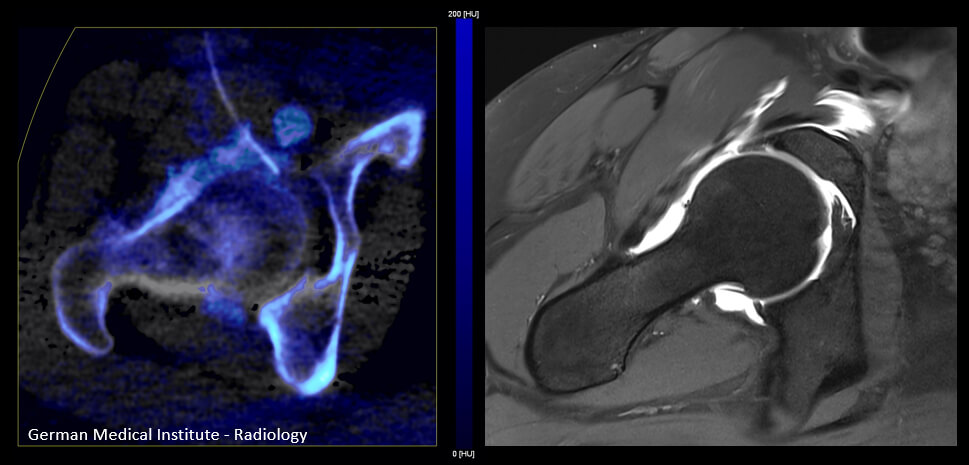
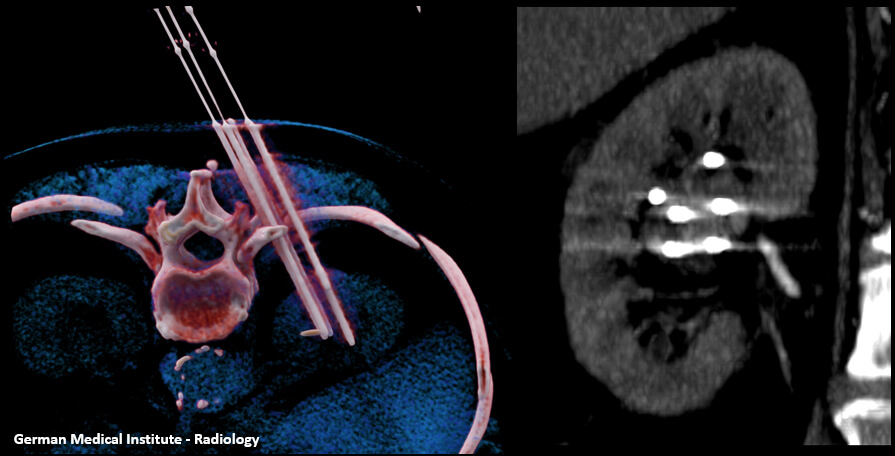
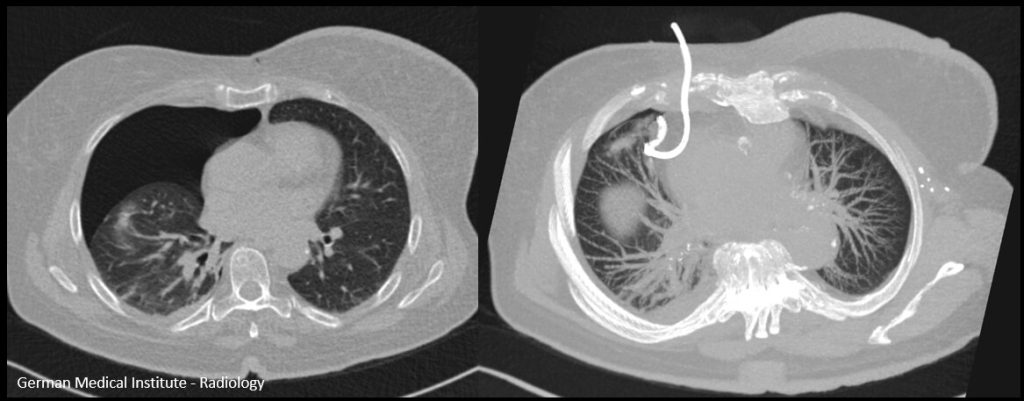
Digital Mammography
Within the breast care unit, specialised interventional procedures are conducted, guided by digital mammography. The application of digital mammography in combination with an advanced stereotactic biopsy system featuring automated robotic technology, enables the precise and time-efficient execution of the following minimally invasive procedures:
- Preoperative hookwire placement
- Marker placement after biopsy or before the initiation of neoadjuvant chemotherapy
- Stereotactic breast biopsy with three-dimensional digital technology (Stereo- and Tomo-biopsy)
Stereotactic breast biopsies employ modern needles equipped with an aspiration system, facilitating the collection of more tissue samples of a larger size, increasing the diagnostic accuracy of the histological analyses. The interventional procedures are performed by specialised breast radiologists and trained radiographers.
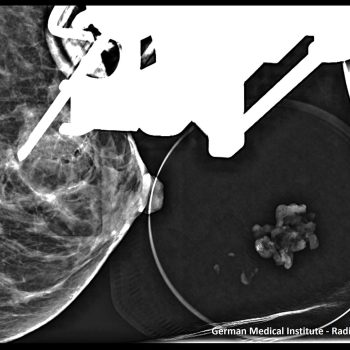
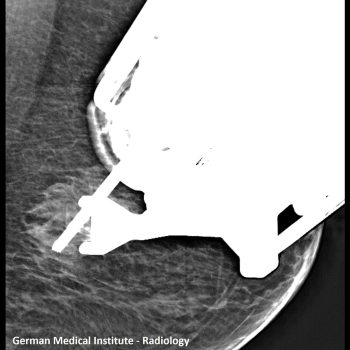
Angiography / Fluoroscopy
Our centre offers a wide spectrum of minimally invasive procedures in the angiography/fluoroscopy unit through our interventional radiology department. These procedures frequently involve collaborative efforts with other specialties such as vascular surgeons, urologists, gastroenterologists, and more.
The following procedures are performed using two new state-of-the-art angiography units, one fluoroscopy unit and a mobile C-arm:
- Diagnostic and interventional procedures involving the arterial and venous system are routinely performed, often in collaboration with vascular surgeons.
- Embolization of tumours and haemorrhages.
- Placement of central venous lines for chemotherapy, parenteral nutrition, antibiotic therapy with imaging guidance (port-a-cath, picc line, Hickman line).
- Interventional procedures involving the biliary system such as cholecystostomy, percutaneous cholangiography (PTC), percutaneous biliary drainage, percutaneous biliary angioplasty with balloon and stend placement, transluminal biliary biopsy with forceps, opening of obstructed biliary stents by angioplasty and placement of drainage and/or stenting, stone removal.
- Chemoembolization in malignant liver neoplasms (TACE).
- Interventional procedures in the urinary tract such as percutaneous nephrostomy, ureteral angioplasty with balloon, percutaneous placement of Double-J ureteral stent, percutaneous placement of renal ureterostomy.
- Cyst puncture and alcohol therapy.
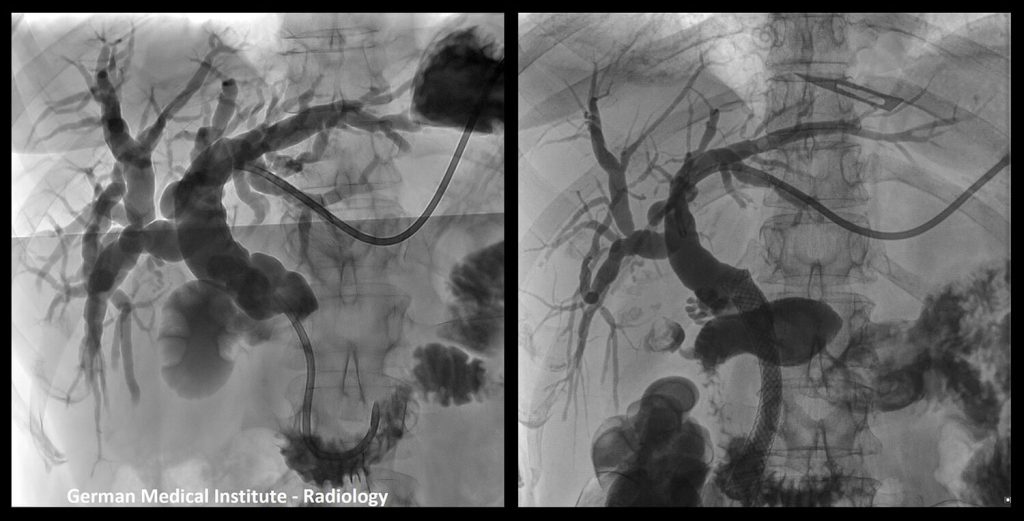
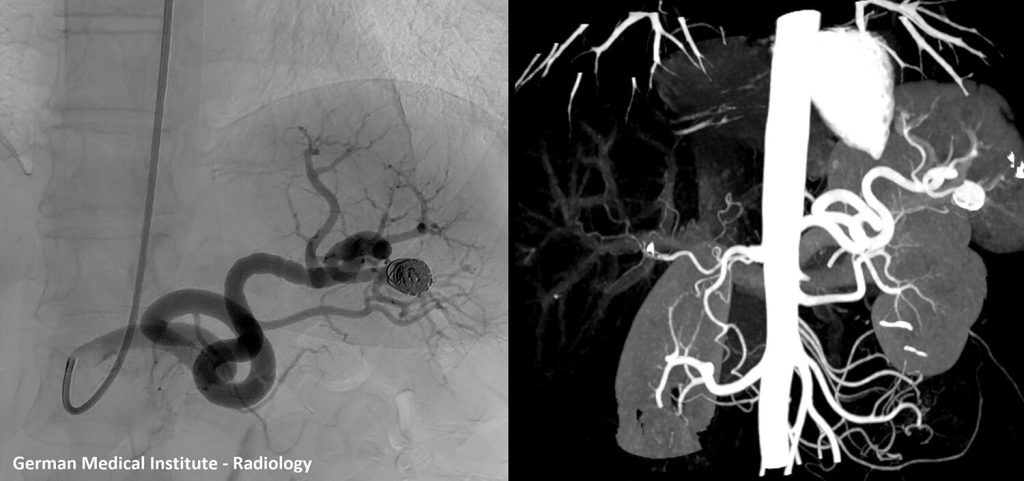
Ultrasound
The interventional radiology department, leveraging its medical staff’s extensive experience and specialised equipment, provides the capacity to conduct a multitude of ultrasound-guided interventional procedures, such as:
- Guided biopsies, marker placement, and preoperative placement of breast hookwire.
- Guided liver biopsies.
- Stereotactic MRI/US fusion guided prostate biopsies.
- Percutaneous drainage of intrathoracic or abdominal collections.
- Thyroid Fine Needle Aspiration (FNA).
- Thyroid gland nodule ablation.
- Interventional operations of the musculoskeletal system (injections, barbotage, etc.).
